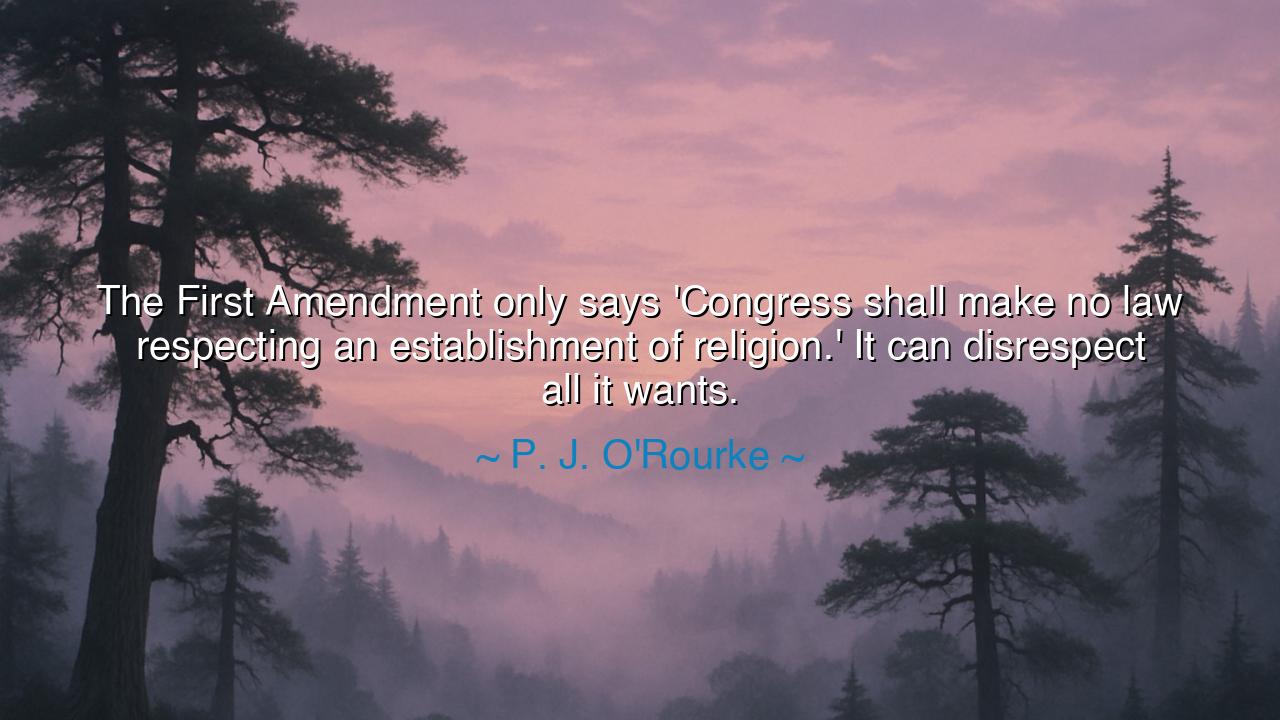
The First Amendment only says 'Congress shall make no law
The First Amendment only says 'Congress shall make no law respecting an establishment of religion.' It can disrespect all it wants.






P. J. O’Rourke, with the sharpness of satire and the insight of one who understood the ironies of liberty, declared: “The First Amendment only says ‘Congress shall make no law respecting an establishment of religion.’ It can disrespect all it wants.” In this jesting yet profound observation lies a paradox of freedom: that in protecting liberty, the law shields belief from the chains of government, yet leaves it vulnerable to the storms of ridicule, doubt, and scorn. For true freedom does not mean protection from offense, but the endurance of faith even when surrounded by disbelief.
The origin of this thought rests in the history of the First Amendment itself, written by the framers of the United States Constitution in 1791. They, having fled lands where kings and churches joined to dictate conscience, sought to erect a wall between government and religion. No ruler was to compel worship, no law to dictate creed. Yet they also knew that liberty of speech would allow men to mock, to question, to deride what others held sacred. Thus, freedom itself is a double-edged sword: it protects the altar from the state, but not from the voice of one’s neighbor.
The ancients wrestled with this same truth. Socrates, though condemned for impiety, stirred Athens with questions that offended priests and citizens alike. Rome permitted many gods, yet mocked them freely in its plays and poetry. Even the prophets of Israel were scorned by their own people, though their words came from fire and thunder. O’Rourke’s words remind us that disrespect of religion is not a violation of liberty, but its very test. Faith that cannot withstand laughter is fragile, and conviction that trembles before insult is shallow.
Consider the story of Voltaire, the French philosopher who declared, “I disapprove of what you say, but I will defend to the death your right to say it.” He mocked the Church’s abuses, exposed hypocrisy, and offended many. Yet his work paved the way for freedom of conscience in Europe. He embodied O’Rourke’s irony: that in a free society, one must endure not only protection of religion but also its criticism, its satire, even its disrespect, for such is the price of liberty.
Yet, O listener, do not think O’Rourke’s words are an argument against faith. Rather, they are a challenge to it. If your religion is true, let it endure the test of mockery and doubt. If it is rooted in eternal principles, it will not be broken by the laughter of men. Indeed, many of the world’s greatest religions have grown stronger in persecution, their truths refined like iron in the fire of ridicule. Disrespect may wound pride, but it cannot slay truth.
The lesson is clear: do not seek laws to shield your beliefs from insult. Instead, live them so powerfully, so sincerely, that no mockery can rob them of dignity. Understand that freedom of speech means freedom both to praise and to scorn, to worship and to ridicule. Guard this freedom even when it stings, for to silence another’s voice today may mean the silencing of your own tomorrow.
Practical wisdom flows from this: when confronted with words that disrespect your faith, do not respond with rage or violence. Respond with strength, with calm, with living proof that your beliefs make you wiser, kinder, more steadfast. Let your life be your defense. For laws can only restrain the tongue, but only truth lived out can silence falsehood.
So remember, O children of tomorrow: the First Amendment does not promise you reverence, only freedom. And freedom is greater than reverence, for it gives you the space to believe, to doubt, to speak, to argue, to mock, and to defend. Cherish this gift, for it is the crucible in which both truth and character are tested. And know this: a faith that survives freedom is a faith that cannot be broken.






AAdministratorAdministrator
Welcome, honored guests. Please leave a comment, we will respond soon